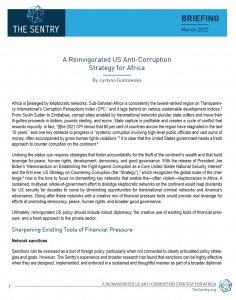 Read the full briefing
Read the full briefing
Africa is besieged by kleptocratic networks. Sub-Saharan Africa is consistently the lowest-ranked region on Transparency International’s Corruption Perceptions Index (CPI),* and it lags behind on various sustainable development indices.* From South Sudan to Zimbabwe, corrupt elites enabled by transnational networks plunder state coffers and move their ill-gotten proceeds in dollars, pounds sterling, and euros. State capture is profitable and creates a cycle of conflict that rewards impunity. In fact, “[t]he 2021 CPI shows that 80 per cent of countries across the region have stagnated in the last 10 years,” and one key obstacle to progress is “systemic corruption involving high-level public officials and vast sums of money, often accompanied by gross human rights violations.”* It is clear that the United States government needs a fresh approach to counter corruption on the continent.*
Undoing the status quo requires strategies that foster accountability for the theft of the continent’s wealth and that build leverage for peace, human rights, development, democracy, and good governance. With the release of President Joe Biden’s “Memorandum on Establishing the Fight Against Corruption as a Core United States National Security Interest” and the first ever US Strategy on Countering Corruption (the “Strategy”),* which recognizes the global scale of the challenge,* now is the time to focus on dismantling key networks that enable the—often violent—kleptocracies in Africa. A sustained, multiyear, whole-of-government effort to dislodge kleptocratic networks on the continent would reap dividends for US security for decades to come by diminishing opportunities for transnational criminal networks and America’s adversaries. Going after these networks with a creative mix of financial pressure tools would provide real leverage for efforts at promoting democracy, peace, human rights, and broader good governance.
Ultimately, reinvigorated US policy should include robust diplomacy, the creative use of existing tools of financial pressure, and a fresh approach to the private sector.
Recommendations
The United States should urgently deploy a robust strategy that utilizes pressure tools and incentives to change the status quo of corruption-driven insecurity and continued crises in sub-Saharan Africa.
> When imposing sanctions, don’t just sanction individual officials, who often conduct business through cutouts and companies. For sanctions to have a real impact, focus on entire networks, in particular the enablers and facilitators that need access to global finance.
> Consider the appropriateness of utilizing GloMag sanctions authorities before setting up yet another country-based sanctions program related to Africa.
> Be creative and proactive by considering all available pressure tools. Network sanctions should be just one part of a broader pressure strategy that includes advisories, export controls, import restrictions, responsible investment reporting requirements, and prosecutions.
> Make sure network sanctions are accompanied by a clear strategy involving political engagement and multifaceted diplomatic pressure, including from Cabinet-level officials.
> Provide training to the diplomatic corps on corruption case studies, risk indicators, typologies and red flags, and tools of financial pressure.
> Ensure that relevant agencies, in particular the Departments of Treasury and State, have adequate staff and resources focused on Africa to sustain an ongoing pressure campaign.
> Prioritize technical assistance and capacity building by the Treasury Department to support domestic and regional efforts to counter corruption and money laundering within the African banking system, in particular by supporting local FIUs and other financial regulatory and supervisory bodies.
> Consider convening a working group of like-minded states to counter kleptocracy within regional African banking hubs.
> Pursue a senior-level diplomatic mission to urge key US allies to adopt GloMag-style sanctions and increase coordination on targets among like-minded states.
> Issue additional FinCEN AML advisories targeting illicit financial flows related to Africa.
> Consider issuing multi-agency business advisories with respect to certain jurisdictions or sectors in Africa.
> Bring back responsible investment reporting requirements.
> Press jurisdictions serving as regional African banking hubs to issue advisories or circulars describing illicit financing case studies, risk indicators, typologies, and red flags that domestic banks can use to improve their AML/CFT compliance programs.
> Ensure that the development and technical assistance agencies—from USAID to State DRL and INL to Treasury OTA—integrate financial pressure strategies into their training programs to both maximize impact and enhance implementation of SDG 16.
> Convene a meeting of senior executives in the private sector, in particular at global banks, and make it clear to them that countering kleptocracy in Africa is a USG priority. Enlist them to help drive that message within their organizations and more broadly in the financial sector.
> Revive the “SAR Activity Review” to improve information-sharing with the private sector.
> Urge global correspondent banks to engage with, and even pressure, their partners in Africa to improve anti-corruption and AML/CFT compliance programs.
Read the full briefing and recommendations >

